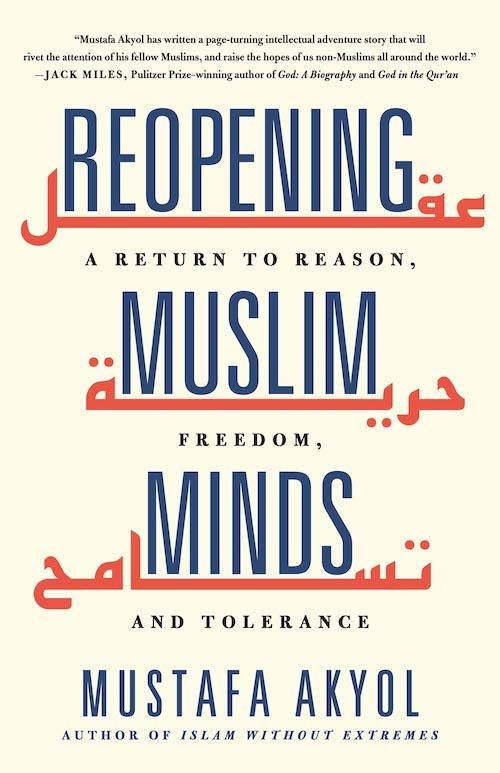Dissolving Rigid Faith
Emina Melonic reviews Mustafa Akyol's "Reopening Muslim Minds: A Return to Reason, Freedom, and Tolerance."
By Emina MelonicNovember 6, 2021

Reopening Muslim Minds: A Return to Reason, Freedom, and Tolerance by Mustafa Akyol. St. Martin’s Essentials. 336 pages.
EVER SINCE the terrorist attacks on September 11, 2001, Islam has been the subject of attacks that treat it only as a destructive ideology. In his new book, Reopening Muslim Minds: A Return to Reason, Freedom, and Tolerance, Mustafa Akyol moves beyond the divisive discourse and delves into the faith without being defensive or apologetic.
His book is a catalyst for dialogue not only between Muslims and non-Muslims but also between Muslims themselves. As the title suggests, his objective is to reawaken Islam and Muslims to their own rich tradition.
Akyol recalls how he told an audience in Malaysia that “apostates should be neither executed nor ‘rehabilitated,’ but just left alone with their conscience.” He ended by saying, “Faith is not something you can police.” This got him arrested and brought before a Sharia court. The experience made him question whether the “religion police” across the Islamic world are aware of their own exegetical, philosophical, and theological tradition.
One of his heroes is Ibn Rushd, better known in the Western world as Averroes, who became an interpreter of Aristotle’s philosophical work and “set out on a mission to prove its compatibility with Islam.” The center of Akyol’s book is the tension between truth and revelation, whether we should read the Qur’an literally or allegorically, and Ibn Rushd’s insistence that Islam needs to have a relationship between faith and reason. Akyol writes, “While arguing that revelation itself commands philosophy, Ibn Rushd also argued that the findings of philosophy would not contradict the teachings of revelation.”
Fundamentalist scholars may say that Ibn Rushd was trying to “liberalize” Islam and erred in his Qur’anic interpretation. But Akyol is ready for oppositions like these and writes that what Ibn Rushd actually did was warn against an “intellectually detrimental” position. “This was a really wise warning,” writes Akyol, “against any ‘post-truth’ world, where facts cease to be facts and all objective knowledge collapses into wishful thinking — whether that wish be religious or secular in nature.” Ibn Rushd’s warnings are also Akyol’s warnings.
The Ottoman Empire made its famous turn away from modernity in the 17th century, and many Gulf states followed suit. Enlightenment values such as democracy bypassed the Arab street with only a few exceptions. Akyol writes:
In the face of this grim freedom deficit, it is no surprise that Muslims who value freedom sometimes distance themselves from the faith. Some totally abandon it. […] [T]here is now a growing trend of atheism, deism, or conversion to Christianity, precisely because narrow interpretations of Islam are imposed on people by Islamist regimes or groups, only to create a backlash.
In other words, many Muslims live in fear. This is an unacceptable reality and one that must be remedied. For Akyol, this means
giving up coercive power in the name of Islam [—] […] no more religious and moral policing, no threats to apostates and “innovators,” no blasphemy laws, no public floggings or stoning for sinners, and no violence or intimidation in the family.
But this isn’t all. Akyol writes, echoing Muhammad: “Having no compulsion in religion will also require a new Muslimhood — not as collectively disciplined communities, but rather self-disciplined individuals.” “[B]uilding the character of the Muslim individual,” indeed allowing its emergence, is a core concern of the book. The notion of personhood is not foreign to Islam. But somehow along the way, coercion and pseudotheological totalitarianism denied the notion of interior freedom.
This is not to say that Akyol is suggesting devout Muslims abandon their communities or take a relativistic view of religion. The purpose is not to tell Muslims to engage in indulgent behaviors of the West but rather to help them awaken the spirit of reason, freedom, and tolerance. It is by reason that we know nature. Yet at the same time, we shouldn’t consider ourselves as beings that are both the beginning and the end. Without an acknowledgment of interior humility, there could be no ethics and morality. Rigid faith will not inform or shape a person into becoming a better human being. Rather, it will only further beat him into psychological submission and force him into an existential sphere in which he is neither faithful nor free.
Reopening Muslim Minds is a fresh cultural analysis of Islam. The land of discourse, especially on this subject, is indeed barren. Mustafa Akyol’s book is a call not only to prayer but also to reason. It is a work of theological interpretation that affirms human dignity and respect of one another. “Toleration,” writes Akyol,
does not mean evaporation of all difference. But toleration does mean that we should be humble in our judgments, because the ultimate judgment belongs to God. It also means that, beyond our differences, we have a common humanity that connects us.
¤
Emina Melonic is a book and film critic who resides in East Aurora, New York.
LARB Contributor
Emina Melonic is a book and film critic who resides in East Aurora, New York. She is an adjunct fellow at the Center for American Greatness and a regular contributor to The New Criterion, Law & Liberty, and Splice Today, among other outlets.
LARB Staff Recommendations
A Muslim Founder of the Social Sciences?
In "Ibn Khaldun: An Intellectual Biography," Robert Irwin sets out to both demythologize and re-mystify the influential 14th-century philosopher.
There Has Never Been an America Without Muslims
Amir Hussain looks at the long history of Muslims in America.
Did you know LARB is a reader-supported nonprofit?
LARB publishes daily without a paywall as part of our mission to make rigorous, incisive, and engaging writing on every aspect of literature, culture, and the arts freely accessible to the public. Help us continue this work with your tax-deductible donation today!